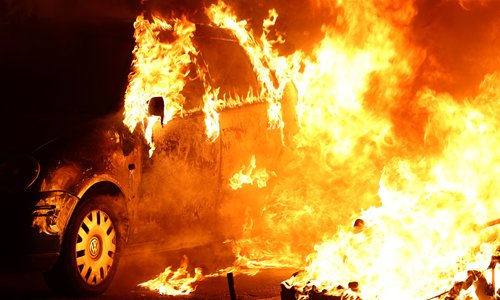HOME >> OPINION
HK rioters set bad example for the West
By Tian Feilong Source:Global Times Published: 2019/10/29 22:18:41

A car burns during a protest after a verdict in a trial over a banned Catalonia's independence referendum in Barcelona, Spain, October 16, 2019. Photo: VCG
Rioters in Hong Kong have set bad examples affecting the globe. Cities such as London in the United Kingdom, Catalonia in Spain and Santiago in Chile have recently been through radical violent protests and confrontations between protesters and police. Western countries used to believe their lands are immune to Hong Kong-style "color revolution." However, in the era of globalization when the internet is so developed, direct interaction between young people from different places has continuously broken this immunity.
Despite the differences in topics and specific legal orders, youngsters in London, Catalonia and Santiago have imitated the full range of tactics of the Hong Kong rioters in a short time, posing serious threats to the rule of law and social order in their countries.
The destruction of the rule of law in one place will inevitably bring about a chain reaction. Imitators will take it for granted that they are able to do whatever Hong Kong rioters can do; the rule of law in Hong Kong can be damaged and so can that of their own countries.
Why can radical demonstration in Hong Kong started from anti-extradition bill protest affect Western countries?
First, the economic crisis of 2008 is still haunting many countries, which have not recovered their economic vitality and living standards, in addition to the influence of extremist and separatist forces. The so-called Western democratic and legal order is not that unshakable, and also faces challenges and pressure from radical social movements.
Second, the low-cost social movement is easy to imitate, which helps youngsters replicate the same pattern of youth activism around the world.
Third, Western politicians and media apply a double standard in dealing with Hong Kong riots and similar affairs in other regions, and this emboldens radical forces there. At the same time, the West itself has to suffer from the serious consequences of the weakening rule of law.
Fourth, anti-globalization sentiment and populism in the Western world following the election of US President Donald Trump and the Brexit referendum have become a strong trend of thought that promotes the rise of the right-wing through electoral politics or attacks the established rule of law through radical social movements.
Based on the above-mentioned factors, Hong Kong's extreme social movement has become a paradigm that was duplicated in Western countries. This has triggered structural decline in value and authority of rule of law around the world.
The Hong Kong paradigm has several key features of extremism. For instance, extremists of a young age are the main force of the movement, who refuse law-based communication. Besides, they cannot be guided and shaped through school and social education, presenting a systematic educational failure as well as a security crisis in society and culture.
The rioters totally abandon peaceful means and are aiming to overthrow the rule of law. They indiscriminately attack police and civilians, implement bullying on the internet and in campus, spread terror in society and create monistic social and political correctness. In addition, they unrestrainedly collude with foreign forces, and thus seriously undermine China's sovereignty, security and development interests, the foundation of rule of law in Hong Kong and the key foundation for the city to sustain and develop.
In the face of the catastrophe of the violent social movement in Hong Kong, Western society cannot conduct effective early warning and joint response due to political interests and ideological prejudice. They want to use the Hong Kong card to exert maximum pressure on Beijing, so as to extract strategic benefits and slow or block China's development.
But this is like the coexistence of different players in the global game order. One party aims for the absolute sacrifice of another party's interests, and uses every means to do so. As a result, the former will backfire as its own values and governance system will become out of balance.
This dangerous and radical pattern is not a rational process of normal competition between countries, but rather an anti-globalization game dominated by the extreme hawks and intelligence agencies of the West. They attempt to reshuffle the global power and interests through extreme riots, retrieving the benefits they lost in the normal global competitive order in this extremely unethical and unscrupulous sinful way.
In short, in the face of the impact of extreme social movements on global governance and the rule of law, political leaders and people of all countries should be sober and conscious and jointly safeguard the core values of the rule of law and multilateral global trade order.
We believe that after this round of riots in Hong Kong and its spillovers, people around the world will cherish the core values of the rule of law and be more convinced that only global cooperative governance and common development are the correct path to resolve all conflicts arising from globalization.
The author is associate professor at Beihang University in Beijing and member of Beijing-based Chinese Association of Hong Kong and Macao Studies. opinion@globaltimes.com.cn
Posted in: VIEWPOINT